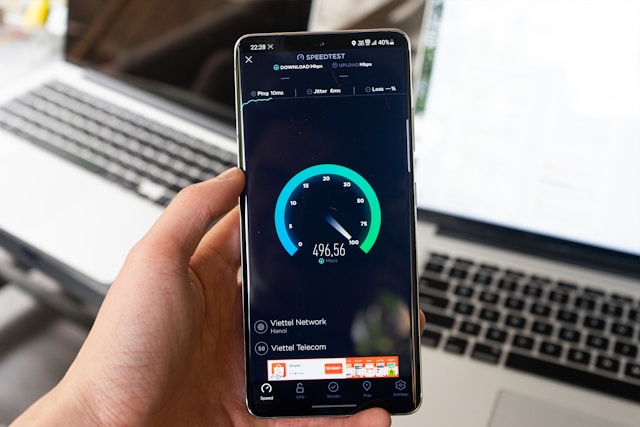
I often find myself immersed in the intriguing world of iGaming. Mainly due to how ever-evolving it is. Staying ahead means embracing innovation. Today, join me as I unveil the latest trends in iGaming, where I get to discuss exciting things like AI, AR &VR, and 5G mobile gaming, among others.
From cutting-edge technologies to groundbreaking gameplay experiences, let me show you the very fabric of what makes iGaming not just a pastime, but a unique evolution that captivates players worldwide.
1. Artificial Intelligence

Artificial Intelligence (AI) stands as a transformative force that’s reshaping the iGaming industry’s dynamics and user experiences. AI technologies are playing a pivotal role in enhancing gameplay, personalization, and security.
One notable application of AI in iGaming is the development of intelligent algorithms for game design. Machine learning algorithms analyze player preferences and behaviors, enabling the creation of tailored gaming experiences. This not only ensures a more engaging environment but also boosts player retention.
Furthermore, AI-driven chatbots and virtual assistants are becoming integral components of customer support in iGaming platforms. These systems provide real-time assistance, addressing queries, and facilitating smoother interactions between players and the platform.
On the security front, AI algorithms are employed to detect and prevent fraudulent activities. By analyzing patterns and anomalies in user behavior, AI enhances the identification of potential threats, ensuring a secure and fair gaming environment.
As iGaming continues to embrace technological advancements, the integration of AI is set to redefine the industry, offering innovative solutions that elevate both user satisfaction and operational efficiency.
2. Augmented and Virtual Reality (AR and VR)

Augmented and Virtual Reality (AR and VR) have rapidly emerged as revolutionary technologies in the iGaming industry, transforming the way players engage with online gaming platforms. These immersive technologies offer a heightened level of interaction, creating an unparalleled gaming experience that transcends traditional boundaries.
In iGaming, Augmented Reality enhances the real-world environment by overlaying digital elements, seamlessly integrating them into the player’s surroundings. This unique augmentation enriches the gaming environment, providing a more interactive and engaging experience. From live casino settings to sports betting overlays, AR introduces a new layer of excitement.
On the other hand, Virtual Reality transports players to entirely new digital realms, immersing them in lifelike and three-dimensional gaming environments. VR headsets enable players to step into virtual casinos, explore fantasy worlds, and interact with games on an unprecedented level. This technology surpasses the limitations of conventional screens. Notably, it offers a fully immersive escape for players seeking something different in their gaming adventure.
The integration of AR and VR technologies is set to redefine industry standards, attract a broader audience, and improve the overall gambling experience. Therefore, it’s safe to say that this cutting-edge technology promises a future where players can enjoy iGaming in ways previously deemed unimaginable.
3. 5G Mobile Gaming: Revolutionizing the iGaming Experience

The advent of 5G technology is also reshaping the iGaming industry like never before. With lightning-fast data speeds and minimal latency, 5G brings a transformative experience for players, developers, and operators alike.
Research indicates that 5G’s impact on mobile gaming is profound. The increased bandwidth allows for more complex and graphically rich games, enhancing overall gameplay and user engagement. Moreover, lower latency ensures smoother and more responsive gaming experiences, eliminating frustrating lags.
Multiplayer gaming stands to benefit significantly from 5G connectivity. Real-time interactions and seamless communication between players become a reality, creating immersive multiplayer environments. This not only elevates the gaming experience but also opens new avenues for competitive gaming and eSports.
The implications extend beyond gameplay, as 5G enables advanced features such as augmented reality (AR) and virtual reality (VR) applications in iGaming. Enhanced graphics, coupled with low latency, create an environment conducive to the integration of these cutting-edge technologies, offering players unprecedented levels of immersion.
4. Responsible Gambling

Responsible gambling involves the implementation of measures and practices that promote a safe and enjoyable gaming experience while mitigating the potential risks associated with excessive or problematic gaming behavior. Operators are increasingly adopting responsible gambling tools and features to empower players with the means to control their gaming activities.
Key elements of responsible gambling include self-exclusion options, deposit limits, reality checks, and comprehensive information about the potential risks of gambling. These measures aim to foster a culture of awareness and provide players with the tools to make informed decisions about their gaming habits.
Regulatory bodies and industry stakeholders are actively collaborating to establish and enforce responsible gambling standards. This includes mandatory compliance with age verification processes, stringent advertising guidelines, and support for problem gambling helplines.
In the iGaming sphere, the commitment to responsible gambling reflects a collective effort to create a sustainable and ethical industry, prioritizing player welfare alongside the pursuit of innovation and entertainment. As technology advances, responsible gambling initiatives continue to evolve, ensuring a balance between industry growth and the well-being of the gaming community.
5. Regulations and Legal Landscape

Staying abreast of regulatory developments is paramount for operators and enthusiasts alike. The legal landscape surrounding online gaming is multifaceted, with jurisdictions worldwide adopting diverse approaches to govern this burgeoning industry.
Many countries are reevaluating their stance on iGaming, either by implementing new regulations or revising existing ones to address the evolving nature of online gambling. For instance, the United Kingdom has adopted a comprehensive regulatory framework overseen by the Gambling Commission, ensuring consumer protection and fair play. Contrastingly, some jurisdictions like Malta have established themselves as iGaming hubs, attracting operators with favorable tax structures and a well-defined regulatory environment.
Moreover, emerging technologies like blockchain are being explored to enhance transparency and security within the iGaming space. The intersection of technology and regulation is reshaping the industry, influencing how operators conduct their businesses and ensuring a safer and more enjoyable experience for players worldwide. As the iGaming legal landscape continues to evolve, stakeholders must adapt to these changes to thrive in an increasingly regulated environment.
6. The Use of Blockchain in iGaming

Blockchain is also one of the latest trends in iGaming. Blockchain’s decentralized nature and immutable ledger system address long standing challenges, fostering trust among players and operators. One key advantage is transparent transactions. Blockchain ensures a tamper-resistant record of all financial transactions, eliminating concerns about fraudulent activities or manipulation of gaming outcomes.
Smart contracts, self-executing contracts with the terms directly written into code, further enhance transparency by automating and enforcing agreements between players and platforms.
Cryptocurrencies, often built on blockchain, are gaining traction as a preferred payment method in iGaming. Bitcoin and other altcoins provide users with faster, more cost-effective, and pseudonymous transactions, reducing reliance on traditional banking systems. For instance, FunFair utilizes Ethereum’s blockchain to enable decentralized casino operations, offering provably fair games with transparent and instant payouts.
Additionally, blockchain enhances data security. Personal and financial information stored on a decentralized ledger is less susceptible to hacking or unauthorized access. This fosters a more secure and trustworthy environment for players, attracting a wider audience to the iGaming ecosystem.
Conclusion
Exploring the latest trends in iGaming unveils a dynamic landscape shaped by cutting-edge technologies and evolving player preferences. Artificial Intelligence revolutionizes gameplay, ensuring personalized and secure experiences. Augmented and Virtual Reality redefine immersion, transcending traditional boundaries.
The advent of 5G transforms mobile gaming, enabling unprecedented levels of interactivity. Responsible gambling initiatives prioritize player welfare, fostering a balanced industry growth.
The regulatory landscape, influenced by emerging technologies like blockchain, shapes a safer and more enjoyable experience. As iGaming continues its thrilling evolution, staying attuned to these trends becomes paramount for operators and enthusiasts alike, ensuring a vibrant and innovative future in the ever-evolving world of interactive entertainment.
